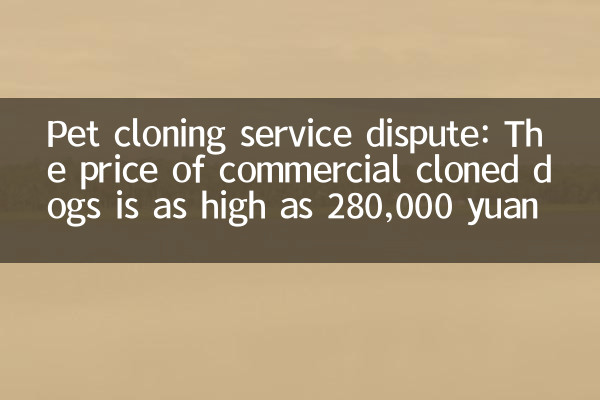Pet cloning service dispute: The price of commercial cloned dogs is as high as 280,000 yuan
In recent years, pet cloning technology has gradually moved from laboratories to commercialization, becoming a hot topic for pet owners. Recently, a news report about the price of commercial cloned dogs as high as 280,000 yuan has caused widespread controversy. Supporters believe this is a manifestation of technological progress and can help the owner continue the emotional bond with the pet; opponents question their ethical issues and commercial tendencies. This article will conduct a structured analysis of this dispute based on the popular topics and hot contents of the entire network for the past 10 days.
1. Current status of pet cloning services

Pet cloning services are gradually emerging around the world, and many biotech companies provide related services. Here are the major pet cloning service providers on the market and their price comparison:
| Company Name | nation | Clone pet types | Price (RMB) |
|---|---|---|---|
| Sooam Biotech | South Korea | Dogs | 280,000 yuan |
| ViaGen Pets | USA | Canines, cats | 250,000 yuan |
| Sinogene | China | Dogs | 200,000 yuan |
As can be seen from the table, the prices of pet cloning services are generally higher, especially canine cloning, with prices ranging from 200,000 to 280,000 yuan. This high cost makes cloning services an exclusive choice for a few high-income people.
2. Focus of controversy
The commercialization of pet cloning services has caused many controversies, mainly focusing on the following aspects:
1. Ethical issues
Does cloning technology violate the laws of nature? Can cloned pets be truly replaced by original pets? These issues have sparked ethical discussions. Many animal conservation organizations believe that cloning technology may cause unnecessary pain to animals, especially the possible failures during cloning.
2. Commercialization tendency
The high price makes cloning services a luxury, further exacerbating social inequality. In addition, some companies have been accused of using pet owners' emotional needs to over-market and even false propaganda.
3. Technical risks
The cloning technology is not yet fully mature, and there is uncertainty about the health and lifespan of cloned pets. According to statistics, the survival rate of cloned pets is about 60%-70%, and some cloned pets may have congenital diseases.
3. Public attitude
Here are the public opinion statistics on pet cloning services on social media in the past 10 days:
| platform | Support ratio | Opposition ratio | Neutral proportion |
|---|---|---|---|
| 35% | 50% | 15% | |
| Zhihu | 40% | 45% | 15% |
| 30% | 55% | 15% |
It can be seen from the data that opposition voices have a slight upper hand, especially on international social media platforms. Many netizens believe that cloning technology should be used in the medical and scientific research fields first rather than meeting personal emotional needs.
4. Future prospects
Despite the controversy, the trend of commercialization of pet cloning technology seems to be unstoppable. In the future, cloning services may become more popular with advances in technology and lower costs. However, how to find a balance between technological progress and ethics is still a question that the whole society needs to think about together.
For ordinary pet owners, instead of spending huge amounts of money to clone their pets, it is better to cherish the time they spend with their existing pets and pay attention to the rescue and protection of stray animals. After all, true love is not in form, but in action.

check the details

check the details